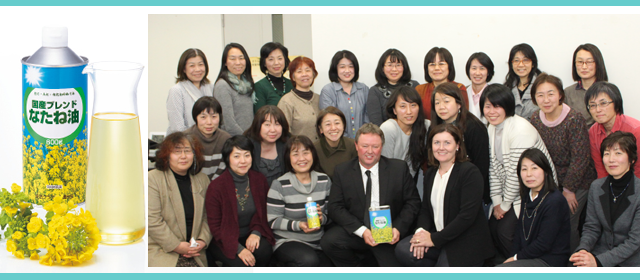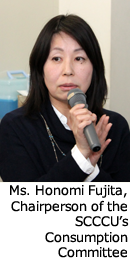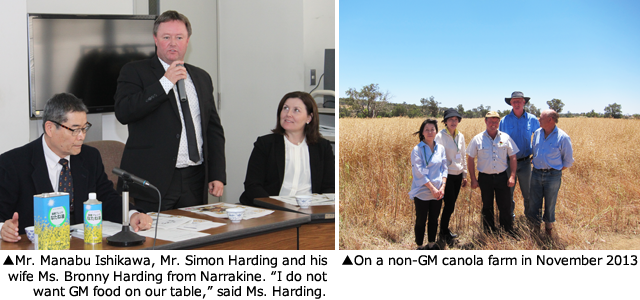GM-free canola farmers from Western Australia
GM-free canola farmers from Western Australia visit the Seikatsu Club

Non-GM farmers from Narrakine Western Choice Pty. Ltd. in Western Australia visited the Seikatsu Club Consumers' Cooperative Union (SCCCU) on March 11th. The farmers produce and export GMO-free canola, which is used to produce canola oil for SCCCU. Members of SCCCU shared their opposition to GM crops with the farmers. (Posted on April 9th)
 SCCCU works for the collective purchase of “Domestically Grown Blended Canola Oil”. The self-sufficiency rate in canola in Japan is only 0.04%, but 5% of the raw material for SCCCU's canola oil is domestically grown. The rest of the material, however, is imported from overseas. Genetically modified (GM) canola has spread in the global market, but we import non-GM canola from Australia because we are opposed to GM crops. President Simon Harding and other people from Narrakine, which produces and exports non-GM canola for the Seikatsu Club, visited SCCCU on March 11th and exchanged opinions with around 50 members of the SCCCU's Consumption Committee.
SCCCU works for the collective purchase of “Domestically Grown Blended Canola Oil”. The self-sufficiency rate in canola in Japan is only 0.04%, but 5% of the raw material for SCCCU's canola oil is domestically grown. The rest of the material, however, is imported from overseas. Genetically modified (GM) canola has spread in the global market, but we import non-GM canola from Australia because we are opposed to GM crops. President Simon Harding and other people from Narrakine, which produces and exports non-GM canola for the Seikatsu Club, visited SCCCU on March 11th and exchanged opinions with around 50 members of the SCCCU's Consumption Committee.
Mr. Harding clearly mentioned to the members of SCCCU that “GMOs should not enter into what we eat. Narrakine works with farmers who have the same idea, and produces and exports non-GM canola.”
 Narrakine produces canola, wheat, barley and hay on a total of about 8,500 hectares of farms. The state of Western Australia had a moratorium on GM crops for several years, but commercial scale plantings of GM canola began in 2010. SCCCU sent a delegation to Western Australia last November and was informed that 10-15% of the total canola planted in the state is now GM. As we are concerned over the gradual expansion of GM canola, it is very important for us to work with like-minded farmers such as those in Narrakine.
Narrakine produces canola, wheat, barley and hay on a total of about 8,500 hectares of farms. The state of Western Australia had a moratorium on GM crops for several years, but commercial scale plantings of GM canola began in 2010. SCCCU sent a delegation to Western Australia last November and was informed that 10-15% of the total canola planted in the state is now GM. As we are concerned over the gradual expansion of GM canola, it is very important for us to work with like-minded farmers such as those in Narrakine.
“We do not know yet what kind of long-term effects GM crops will have on human health,” said Mr. Harding referring to the reasons why he is against GM crops. “Herbicide resistant GM canola is cultivated in Western Australia, and there is a risk of emerging herbicide-resistant weeds. Moreover, we are also concerned that farming would be controlled by companies like Monsanto,” he added. “It may be easier for farmers to grow GM canola, since it is not killed by herbicide. However, I do not think GM canola will spread very rapidly because its yield is not particularly good,” said Mr. Harding.
Australia is the second biggest exporter of canola after Canada. On the other hand, China is rapidly growing as an importer of the crop in recent years. As China imports GM crops, it is feared that GM canola will spread in Australia.
Last November, Ms. Honomi Fujita, chairperson of the SCCCU’s Consumption Committee and the vice-chairperson of the Seikatsu Club Kanagawa, visited Australia, including Narrakine, as a member of a delegation from SCCCU. “Members of the Seikatsu Club take non-GM foods for granted, thanks to SCCCU’s collective purchase,” Ms. Fujita says. “But when I visited Australia, I realized that GM crops have spread widely at a global level in spite of their short history of cultivation of only about 20 years. We cannot be optimistic about the future of non-GM canola given the fact that China is now buying GM canola.” In concluding the meeting, Ms. Fujita told the participants, “That is why our collaboration with Narrakine, which works against GM, is crucial. It is important for us to tell our 340,000 members about this fact, and raise sympathy for farmers who grow non-GM crops.”

生活クラブをはじめませんか?
42万人が選ぶ安心食材の宅配生協です
ウェブ加入限定 無料プレゼント






